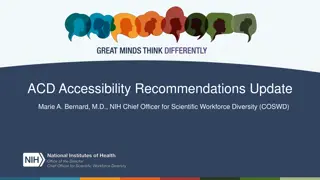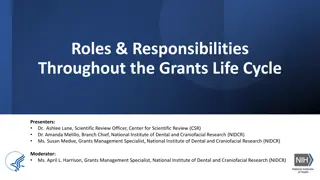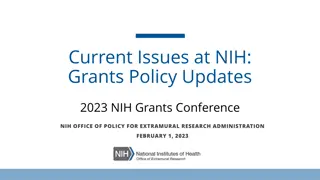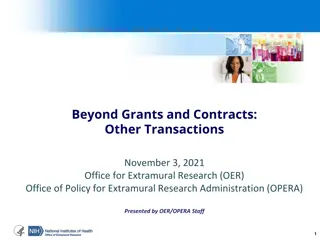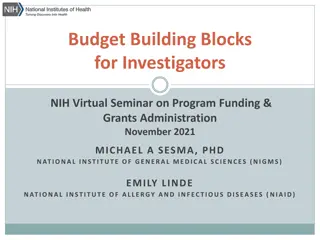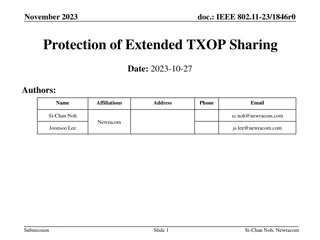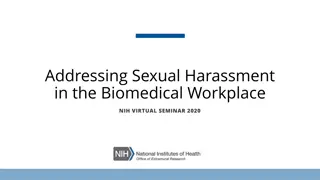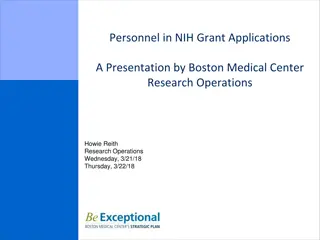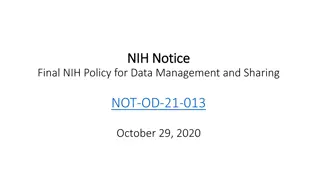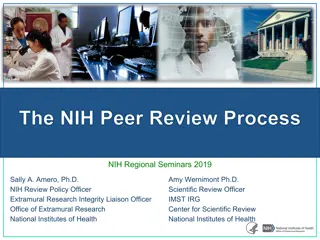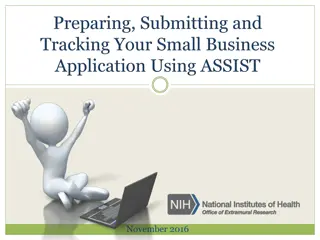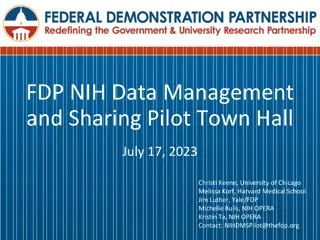NIH Data Management and Sharing Policy Overview
This content provides a detailed overview of the NIH Data Management and Sharing Policy, focusing on the importance of sharing scientific data, the scope of the policy, reasons for data sharing, application of the policy, and differences between Data Management Plans and Resource Sharing Plans. It also highlights the mandatory requirements for data management and sharing in NIH-funded projects.
Download Presentation

Please find below an Image/Link to download the presentation.
The content on the website is provided AS IS for your information and personal use only. It may not be sold, licensed, or shared on other websites without obtaining consent from the author.If you encounter any issues during the download, it is possible that the publisher has removed the file from their server.
You are allowed to download the files provided on this website for personal or commercial use, subject to the condition that they are used lawfully. All files are the property of their respective owners.
The content on the website is provided AS IS for your information and personal use only. It may not be sold, licensed, or shared on other websites without obtaining consent from the author.
E N D
Presentation Transcript
OSP Abby Fellows sponsored.projects@dartmouth.edu Dartmouth Library Research Data Services Lora Leligdon ResearchDataHelp@groups.dartmouth.edu Research Computing @ ITC Elijah Gagne Research.Computing@dartmouth.edu Upcoming events: dartgo.org/RRADworkshops
NIH DMS Plans and Practices NIH DMS policy introduction Overview of the elements of DMS Highlights of a couple of important sections (data repositories, budget, compliance, etc.) DMPTool Writing and reviewing plans RDM guidance Institutional resources OSP Library Research Computing
Scope: Proposals submitted on or after Jan 25th2023 Applies to all research, funded or conducted in whole or in part by NIH, that results in the generation of scientific data Scientific data: the recorded factual material commonly accepted in the scientific community as of sufficient quality to validate and replicate research findings, regardless of whether the data are used to support scholarly publications.
Why does NIH want data to be shared? Advance rigorous and reproducible research Promote public trust in research Increases transparency and accountability Demonstrates stewardship of taxpayer funds Allows research participants contributions to be used in multiple ways Allows for validation of research results Makes datasets accessible Accelerates future directions Opportunities for increased collaboration
Application of Policy Included: Research Projects (Rs) Certain Career Development Awards (Ks) Small Business SBIR/STTR Research Centers Not included: Training grants (T s) Fellowships (F s) Construction (C06) Conference (R13) Resource (Gs) Research-Related Infrastructure Programs (e.g., S06) Policy applies to: Competing grant applications Proposals for contracts NIH Intramural Research Projects Other funding agreements Policy does not apply to: Non-Competing renewals
Data Management Plan vs. Resource Sharing Plan Resource Sharing Plan Not always required Use Resource Sharing Plan Attachment field Address other applicable NIH-wide sharing policies (e.g., Model Organism Sharing Policy, Research Tools Policy) Respond to any NIH Institute and Center or program-specific expectations related to non-data resources (e.g., software sharing) outlined in the specific funding opportunity Data Management and Sharing Plan Required for all applications subject to the NIH Data Management and Sharing Policy Use new Other Plan(s) Address data management and sharing Address genomic data sharing (GDS) Respond to any NIH Institute and Center or program-specific expectations related to data sharing outlined in the specific funding opportunity
Elements of 2023 NIH Data Management and Sharing Plan Describe data collected, data to be shared, rational for sharing, and data documentation Data type Related tools, software, code Tools and software needed to access and manipulate data Standards to be applied to scientific data and metadata Standards Data preservation, access, timelines Repository to be used, persistent unique identifiers, and when/ how long data will be available Access, distribution, reuse considerations Description of factors for data access, distribution, or reuse Oversight of data management Plan compliance will be monitored/ managed and by whom
What data needs to be shared? Data that is of sufficient quality to validate and replicate research findings May include qualitative data or data produced using fundamental basic science techniques Findings can include unpublished and/or negative/null results End of award: data underlying unpublished key findings, developments, and conclusions findings documented within preprints, conference proceedings, or book chapters
Data that does not need to be shared All data should be managed; not all must be shared Lab notebooks preliminary analyses case report forms data from optimizing a protocol that does not support a research finding Data obtained from a repository that is already available
Limitations on sharing NIH expects that researchers will maximize scientific data sharing. Certain factors (i.e., ethical, legal, or technical) may necessitate limiting sharing to some extent. The DMS plan should describe what data will and will not be shared and why. Ethical, legal, and technical factors for limiting sharing of data include: Informed consent will not permit or limits scope of sharing or use Privacy or safety of research participants would be compromised and available protections insufficient Explicit federal, state, local, or Tribal law, regulation, or policy prohibits disclosure Restrictions imposed by existing or anticipated agreements with other parties Datasets cannot practically be digitized with reasonable efforts Additional considerations: NIH respects Tribal sovereignty and supports responsible management/sharing of American Indian / Alaska Native participant data SBIR/STTR Program Policy Directive permits withholding data for 20 years, as stipulated in agreements and consistent with program goals
When should I share my data? As soon as possible! At time of publication: Data must be shared no later than the article is available in electronic format or print. PMC can be proposed as part of the plan contingent on NIH approval Release of pre-print does not trigger the NIH data sharing requirement At the end of the performance period: Data not shared through publications must be shared at the end of the performance period unless the grant enters a no-cost extension or is renewed. NIH expects sharing of null and negative results. When applying for a renewal, sharing data from the previous performance period should be addressed.
Budget Budget is entered as a single line item for DMS Plan costs. These costs are separate from existing budget components/costs of conducting research and are separate from personnel effort. Unallowable Costs: Infrastructure costs typically included in indirect costs Costs associated with the routine conduct of research (e.g., costs of gaining access to research data) Fees for accessing existing data sets as part of research Costs for cloud based electronic notebooks if used for multiple projects Allowable Costs: Curating data/developing supporting documentation Formatting data for sharing De-identifying data Preserving/sharing data through repositories Local data management considerations Data repository fees IMPORTANT: Costs Must be incurred during the performance period
Budget considerations Determine repository costs Repository specific May include data deposit and/or long term storage fees Range from free to $1000s Based on dataset size, security/permissions, curation levels Preparing data, metadata, de-identification, etc. External service Member of the project team people can be budgeted in two locations: Conducting the science Data sharing costs as part of the single line cost Resources to help with costs to consider: OpenAIRE Estimating Costs RDM Tool (this is in Euros and needs conversion to USD) NIMH Data Archive (NDA) s budgeting guide and NDA Data Submission Cost Estimation Tool
DMS Plan Budget Justification Label: Data Management and Sharing Justification If no costs: No costs incurred for Data Management and Sharing Recommended length no more than page Include summary of type and amount of scientific data to be preserved and shared and the name of the established repository(ies) to be used Use general cost categories such as curating data and developing supporting documentation, local data management activities, preserving and sharing data through established repositories, etc. Include a breakdown of personnel effort for named personnel. Include an amount for each category and a brief explanation.
Oversight of Data Management The primary investigator is responsible for ensuring that the DMS plan is executed. Establish a regular interval for data review and management. Describe how the PI will monitor compliance with the plan including frequency. List roles of people responsible for implementing the plan (e.g., Post-Doc, Research Scientist, Research Assistant, etc.) List description of tasks (e.g., metadata creation, formatting data for sharing, de-identifying data, etc.) NIH expects compliance will be reported annually in the RPPR
DMS plan review Review of plan is conducted by NIH Peer reviewers will not see plan unless noted in FOA but will consider if budget is reasonable NIH review at JIT Plan changes? Compliance is reported in RPPR Compliance may affect future funding decisions Non-Compliance may lead to award termination NIH program staff may request changes Approved plan becomes part of terms and conditions of award Work with NIH program officer to review and approve modifications New NOA will be issued with updated plan Plan is submitted as a separate document Reporting
Collecting data with sharing in mind Reproducible Research using FAIR Data LIBER Implementing FAIR Data Principles: https://libereurope.eu/wp-content/uploads/2020/09/LIBER-FAIR-Data.pdf
Choosing a repository NIH strongly encourages subject-specific, open access Data Sharing Repositories as a first choice. Researchers should review the specific guidance to determine designated data repository(ies). If no repository is specified by NIH, Primary consideration should be given to repositories that are discipline or data-type specific to support effective data discovery and reuse. NIH recommended repositories are provided. Evaluate repositories on desired characteristics, such metadata, access, security, preservation, etc. Human subjects data requires additional considerations. If no appropriate discipline or data-type specific repository is available: Submit smaller datasets (less than 2 GB) to PubMed Central as supplemental information Select a generalist repository (Dryad, Figshare, OSF, etc) Use Dartmouth Dataverse, our institutional repository The use of Unique Persistent Identifiers (PID) is encouraged, and their use is a desirable characteristic of data repositories
Writing your DSM Plan Write DMPTool.org for templates and guidance Draft Data Management and Sharing Plan Template NIH Sample Data Management Plans available Review Data Management and Sharing Plan Checklist Contact: ResearchDataHelp@groups.dartmouth.edu
Other considerations and reminders Check for Funding Announcement and NIH Institute specific instructions!!! URLs and Hyperlinks are NOT allowed in the plan Plans may be more than 2 pages List specific repositories Include in the plan sharing data that is not published at the end of the project This is a new process for all of us including the NIH and the guidance will be evolving Investigators will have the opportunity to work with NIH during the JIT process to address any changes or additional information required.



